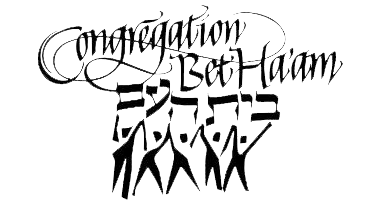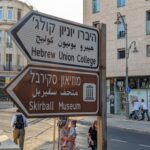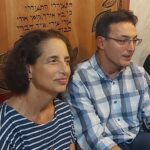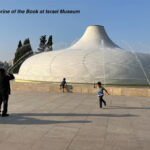By Sarah Szanton
“Want to go pray in the street?” our cousin Nachshon casually asked us on a Friday night after candle-lighting.
“In the street?” I asked. Isn’t that dangerous? I thought. Won’t we get hit by a car? Won’t people think we’re crazy? Maybe he meant something different. A parade in the street? A block party? Who knew? We had been in Israel for a couple weeks already, and life here seemed full of surprises.
“Yes, the neighbors gather right here,” Nachshon said, pointing outside. People were in fact gathering to daven, grouped behind a 13-year-old boy. It was mostly men, while kids rode on bikes and trikes, weaving in and around the daveners, welcoming Shabbat in their own way. Women were mostly at home, busy with last-minute preparations for Shabbat.
Surprises like this kept popping up on our trip to Israel this past October. Jewish observance, rituals, world views and life itself looked different from what we were used to in the U.S. Yet we felt at home because we were in the Jewish state and there it all made sense. We prayed in the street because it was convenient. And since no one drives on Shabbat, there were no cars to worry about.
During our three weeks in Israel, Nathan and I were lucky enough to be welcomed into the homes of our Israeli cousins on multiple occasions. A giant Sukkot celebration brought together almost 50 family members, the entire gang except for those currently serving in the Israeli Defense Force (IDF). Even though Israel is only about the size of New Jersey, the whole mishpacha usually gathers only for weddings and Bar or Bat Mitzvahs. Evidently, the visit of cousins from the U.S. ranked up there as an occasion worth that kind of effort. They wholeheartedly welcomed us to Israel and made sure we knew we were home.
These Israeli Szantons (זנטון in Hebrew) descend from two brothers who are still alive, first cousins of Nathan’s late father. The brothers, children of American socialists who later embraced Zionism, made aliyah in the 1960s and early 70s, married Israeli women, and began families that have been fruitful and multiplied. Those in our generation know they have roots in the U.S., but they’ve lost connections with most family members on the American side. Their branch of the family, descended from Victor, stayed in Israel and stayed Jewish. The other branches, descended from Victor’s siblings, stayed in the U.S. and (formally or informally) left Judaism – except for Nathan and me, and our kids. Reuniting under that Sukkah on a moshav between Jerusalem and Tel Aviv felt miraculous for us all.
When we weren’t visiting with family, our home base was a West Jerusalem apartment that had more idiosyncrasies than surprises: a balcony that served as a laundry room; a kitchen that lacked a coffee maker and most other basics – except for a Shabbat hot plate, washing cup, and electric kettle; and no elevator to get up to the fourth floor. The entire neighborhood shut down for Shabbat, except for Aroma Espresso Bar, a good-size restaurant down the street. The Italian Synagogue was a block away. The Great Synagogue of Jerusalem was a few blocks away on King George Street. Kehillat Har-El, the first Reform congregation in Israel, was even closer. We walked there on our very first morning in Jerusalem, the first day of Sukkot, and they gave us our own lulav and etrog.
Wherever we went, in Jerusalem or on side trips, we discovered surprises. Layers of excavation in the Old City literally opened up intersecting ancient civilizations for us. Museums, in particular The Israel Museum and Yad VaShem – The World Holocaust Remembrance Center transfixed us through stories and architecture. Enjoying the 41-minute train ride from Jerusalem to Tel Aviv made us jealous! If only rail travel were that easy in the U.S.! In Tel Aviv, we were amazed by the constant buzz of electric scooters whirring by us in their own special sidewalk lane. On our way back to Jerusalem after a family visit in the Negev, we explored the ancient man-made caves of Maresha and Bet Guvrin. Looking for markers designating the next cave, Nathan said to me, “This is like a treasure hunt!” It was a metaphor for our whole trip.
Even more than the sights, though, the people we met stuck with us.
Reuven, our American-born tour guide on a one-day Jewish National Fund bus tour, grew up in the U.S. and came to Israel for his first year of rabbinical school at Hebrew Union College. He changed his mind about becoming a rabbi, decided to make aliyah, and now teaches American high school students studying in Israel. A summer is not enough, he told us, to make an impression on kids. An academic year, though, might convince them to consider making a life in Israel, as he did. A life where, he told us, he feels “more alive” than he ever did in the U.S.
Oded, our cousin, is a busy guy in his early 40s with a family and career. As a young man, he did his required military service, served in the Reserves after that, and, once he reached the age where service in the Reserves was optional, thought about quitting. But no! His wife would not hear of it. Their young children needed to see their dad put on a uniform, pick up his backpack, and go off to help defend the state, she argued. So he stayed in.
Yair, a young Ukrainian Jewish man, an engineering student in Tel Aviv, helped us board the correct train going from Tel Aviv to Rehovot. Then he sat with us on the ride. He told us about his family trapped in Ukraine. He speaks with them every day, even as he builds his own future. Someday he might like to live in the U.S. But the country is so big, he said. What states or cities did we think he should consider? Naturally, we invited him to visit us in Portland!
Mohammad, our Palestinian taxi driver, is a man in his 20s. Everyone thinks he’s older, he told us, because of his beard. He lives with his parents and siblings in an apartment in East Jerusalem. They love horses. If someday he visits the U.S., he would love to go to the Kentucky Derby. Mohammad drove us to a Jewish settlement on the West Bank on a Friday afternoon and picked us up at 9:00 that evening. Our cousins walked us to his car. He rolled down his window, smiled at them, and said, “Shabbat Shalom!”
An African-American woman from Chicago sat next to us on the first leg of our journey home, from Tel Aviv to Istanbul. We chatted about our respective trips. She gushed about the sights she had seen: Bethlehem, the Church of Nativity, the Stations of the Cross, the Mount of Olives, and more. She saw where Jesus performed miracles, where he preached, where he was crucified, and where he rose from the dead. She felt fulfilled as a Christian.
Even people we didn’t technically meet intrigued us. Amidst the holiness and the history, people from all walks of life went about their daily business.
- Families walked to synagogue on Sukkot. They carried lulavs and etrogs; pushed strollers, and held hands with young children. Sisters often wore matching dressy outfits.
- Soldiers, who looked like kids to us, were all over: buying food in crowded outdoor markets, shopping at malls in Tel Aviv, and touring museums. They wore uniforms and carried guns, and they checked their cellphones just as much as young people everywhere.
- Families, some dressed casually and some men in black hats, picnicked at Gan Ha-atzmaut – Independence Park in Jerusalem.
- Little kids flew kites on the courtyard of the Israel Museum and climbed on the wall in front of the majestic white dome of the Shrine of the Book.
- Thousands of people from all over the world marched to Sacher Park in a giant pilgrimage during Chol HaMoed Sukkot (the intermediate festival days). We didn’t know what was going on. “We are spreading love for Jerusalem! Please join us!” a German Christian woman explained to us.
Coming home to Maine on October 31, we encountered Halloween, falling leaves, a strange sense of quiet and order, and a huge sense of, “Whoa! What just happened?” It didn’t feel like a vacation, but what was it exactly? A family reunion, an exploration of roots, an expansion of identity, a journey home, maybe even a sacred pilgrimage. The Israeli election was held the day after our return. It was the fifth Israeli election since 2019, but the only one that I actually followed and cared about. I subscribed to a new podcast called “Israel from the Inside,” and I continued to struggle through a thought-provoking but difficult Israeli novel. I have no great resolutions to follow up this trip – just a desire to keep learning more, and to go back soon.
This was my third trip to Israel, but for some reason it felt the most impactful. Maybe going to Israel was always this amazing, but I have trouble remembering earlier trips. Maybe, though, it’s a country so steeped in history, holiness, diversity, complexity, conflict and unity, that every time you go, you experience epiphanies. As an American, as a Mainer, as a Reform Jew, and as a human being, having had this tiny taste of the Jewish state expanded my vision and my identity. I’m grateful and enthusiastically recommend that, when you can, you consider your own journey to Israel. It won’t be the same as mine, but it’s sure to open your mind to a corner of the world that needs our hearts, our minds, and our prayers.






